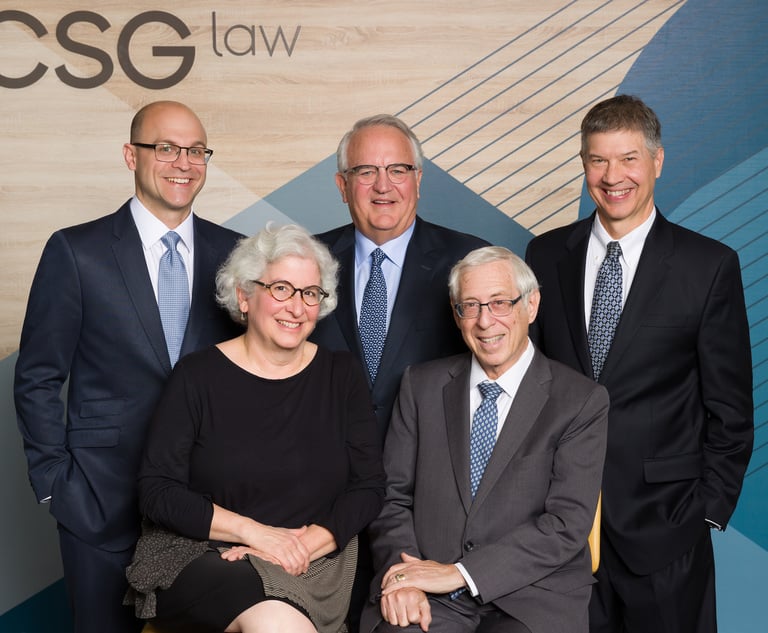 (Photo: jijomathaidesigners/Shutterstock.com)
(Photo: jijomathaidesigners/Shutterstock.com)In Insurance Licensing Case, State's Digital Evidence Nixed After Prudential Can't Explain It
A New Jersey administrative law judge bars introduction of electronic evidence by the state after witnesses from Prudential are unable to explain how it was gathered.
August 31, 2018 at 10:59 AM
6 minute read
In a decision that appears to shed some light on how thoroughly digital evidence must be authenticated before it's admissible, a New Jersey administrative law judge has barred introduction of electronic evidence by the state after witnesses from Prudential were unable to explain how that data was gathered.
Administrative Law Judge Barry Moscowitz ruled on Aug. 29 that the commissioner of Banking and Insurance could not admit into evidence audio recordings of calls allegedly made by John Savadjian while he was an agent for Prudential.
Moscowitz said the audio could not be admitted because Charles Shanley—a director in Prudential's corporate investigation division, whose testimony was presented to authenticate the evidence—apparently knew very little about the program used to collect and store the recordings.
Savadjian faces fines and revocation of his insurance producer license based on allegations that he transferred “orphan” accounts to his book of business without authorization from his superiors or the consent of the policyholders. The state also accuses Savadjian of forging signatures of policyholders and misrepresenting his identity to Prudential's customer service office over the phone. The state claims the alleged misconduct took place while Savadjian was working as an agent in a Prudential office in Oradell.
Savadjian denies the allegations.
The state offered into evidence a CD with recordings of 60 phone calls allegedly made by Savadjian, a spreadsheet showing various metadata concerning the calls and a closing memo containing a summary of the investigation. But Savadjian asserted that those items are not authentic, because the audio recordings had been stripped of their metadata.
According to Moscowitz's decision, the state initially intended to call Thomas Schreck, director of Prudential's corporate investigation division, to authenticate the evidence. Schreck reviewed the 60 calls along with a retired Prudential employee working with the company on a temporary basis, Anita Wallwork, who created the metadata report containing the date and time each call was placed, the number from which it was placed, whether Savadjian was on the call, the names of clients on the call, policy numbers discussed on the call and a summary of what was discussed.
Schreck was supposed to testify in November 2016, but, less than a week before the date, the state said Schreck had been suspended from Prudential and that Prudential would find someone else to authenticate the evidence in the case. The Department of Banking and Insurance then settled on Shanley, who testified In December 2016 and August 2017, Moscowitz said.
Shanley testified that he had completed hundreds of investigations for Prudential but was not involved in the investigation of Savadjian. Moscowitz ruled that Shanley, based on his lack of personal knowledge of the case, could not authenticate the CD, spreadsheet or report. The judge memorialized his ruling in a January 2017 order. In February 2017, the Department of Banking and Insurance modified the order and remanded the case so Shanley could continue his testimony. Shanley, who by that time had retired from Prudential, completed his testimony in August 2017.
On cross-examination, Shanley “revealed just how little he knew about the audio recordings at issue and the software system that recorded them,” Moscowitz wrote on Aug. 29. When Savadjian presented expert testimony questioning the authenticity of the recordings, Shanley “admitted that he did not have enough knowledge to agree or disagree with the expert,” the judge wrote. In addition, Shanley testified that he had “no technical knowledge” of the Verint System software program used to record the calls, including whether deletions can be made to recordings via that software. In addition, Shanley said he did not know if the Verint software could capture metadata from phone calls.
“All Shanley knows is that the CD, the spreadsheet and the report, which DOBI seeks to admit into evidence, match the ones that someone in Prudential's legal department gave to him in 2016. As such, Shanley does not know whether the CD, the spreadsheet or the report—which DOBI says are from 2013—were altered between 2013 and 2016, when Shanley reviewed them,” Moscowitz wrote.
DOBI argued that the judge should listen to the audio recordings to determine their probative value. But Moscowitz said that for him to listen to the recordings before the DOBI makes a prima facie showing that they are authentic would be “dismissive” of a requirement the state Supreme Court set out in State v. Natambu, a 2015 decision holding that a recording must be authentic and correct before it is admitted into evidence.
“Until DOBI provides a witness who can authenticate these documents and provide a residuum of legal and competent evidence to prove that Savadjian made the calls, and that he made the calls when DOBI alleges that he did, these documents will remain inadmissible and will not be admitted into evidence,” Moscowitz said.
The decision is subject to review by the commissioner of the Department of Banking and Insurance, either on an interlocutory basis or at the end of the contested case.
According to Matthew Adams of Fox Rothschild in Morristown, who represents Savadjian, the decision is instructive because it touches on an increasingly important issue in the digital age, and it includes an extensive review of applicable law concerning the use of electronic evidence.
Adams, who handled the case along with the firm's Jordan Kaplan, and Marissa Koblitz Kingman, said the ruling is significant because the proliferation of technology means that more and more evidence is digital in nature, and it requires special handling to ensure it is properly captured.
“Modern digital evidence is three-dimensional, and to preclude someone that stands accused of violating the law in a way that carries consequences of magnitude from defending [oneself] without that entire, three-dimensional thing, in my opinion, is offensive to due process,” he said.
Deputy Attorneys General Ryan Schaffer and Aziz Nekoukar represented the state. A spokesman for the Attorney General's Office, Lee Moore, said his agency would not comment on the case.
The Department of Banking and Insurance and Prudential did not respond to requests for comment by press time.
This content has been archived. It is available through our partners, LexisNexis® and Bloomberg Law.
To view this content, please continue to their sites.
Not a Lexis Subscriber?
Subscribe Now
Not a Bloomberg Law Subscriber?
Subscribe Now
NOT FOR REPRINT
© 2024 ALM Global, LLC, All Rights Reserved. Request academic re-use from www.copyright.com. All other uses, submit a request to [email protected]. For more information visit Asset & Logo Licensing.
You Might Like
View All
Hit by Mail Truck: Man Agrees to $1.85M Settlement for Spinal Injuries

Appellate Div. Follows Fed Reasoning on Recusal for Legislator-Turned-Judge
4 minute read
Chiesa Shahinian Bolsters Corporate Practice With 5 From Newark Boutique
5 minute read
On the Move and After Hours: Brach Eichler; Cooper Levenson; Marshall Dennehey; Archer; Sills Cummis
7 minute readTrending Stories
Who Got The Work
Michael G. Bongiorno, Andrew Scott Dulberg and Elizabeth E. Driscoll from Wilmer Cutler Pickering Hale and Dorr have stepped in to represent Symbotic Inc., an A.I.-enabled technology platform that focuses on increasing supply chain efficiency, and other defendants in a pending shareholder derivative lawsuit. The case, filed Oct. 2 in Massachusetts District Court by the Brown Law Firm on behalf of Stephen Austen, accuses certain officers and directors of misleading investors in regard to Symbotic's potential for margin growth by failing to disclose that the company was not equipped to timely deploy its systems or manage expenses through project delays. The case, assigned to U.S. District Judge Nathaniel M. Gorton, is 1:24-cv-12522, Austen v. Cohen et al.
Who Got The Work
Edmund Polubinski and Marie Killmond of Davis Polk & Wardwell have entered appearances for data platform software development company MongoDB and other defendants in a pending shareholder derivative lawsuit. The action, filed Oct. 7 in New York Southern District Court by the Brown Law Firm, accuses the company's directors and/or officers of falsely expressing confidence in the company’s restructuring of its sales incentive plan and downplaying the severity of decreases in its upfront commitments. The case is 1:24-cv-07594, Roy v. Ittycheria et al.
Who Got The Work
Amy O. Bruchs and Kurt F. Ellison of Michael Best & Friedrich have entered appearances for Epic Systems Corp. in a pending employment discrimination lawsuit. The suit was filed Sept. 7 in Wisconsin Western District Court by Levine Eisberner LLC and Siri & Glimstad on behalf of a project manager who claims that he was wrongfully terminated after applying for a religious exemption to the defendant's COVID-19 vaccine mandate. The case, assigned to U.S. Magistrate Judge Anita Marie Boor, is 3:24-cv-00630, Secker, Nathan v. Epic Systems Corporation.
Who Got The Work
David X. Sullivan, Thomas J. Finn and Gregory A. Hall from McCarter & English have entered appearances for Sunrun Installation Services in a pending civil rights lawsuit. The complaint was filed Sept. 4 in Connecticut District Court by attorney Robert M. Berke on behalf of former employee George Edward Steins, who was arrested and charged with employing an unregistered home improvement salesperson. The complaint alleges that had Sunrun informed the Connecticut Department of Consumer Protection that the plaintiff's employment had ended in 2017 and that he no longer held Sunrun's home improvement contractor license, he would not have been hit with charges, which were dismissed in May 2024. The case, assigned to U.S. District Judge Jeffrey A. Meyer, is 3:24-cv-01423, Steins v. Sunrun, Inc. et al.
Who Got The Work
Greenberg Traurig shareholder Joshua L. Raskin has entered an appearance for boohoo.com UK Ltd. in a pending patent infringement lawsuit. The suit, filed Sept. 3 in Texas Eastern District Court by Rozier Hardt McDonough on behalf of Alto Dynamics, asserts five patents related to an online shopping platform. The case, assigned to U.S. District Judge Rodney Gilstrap, is 2:24-cv-00719, Alto Dynamics, LLC v. boohoo.com UK Limited.
Featured Firms
Law Offices of Gary Martin Hays & Associates, P.C.
(470) 294-1674
Law Offices of Mark E. Salomone
(857) 444-6468
Smith & Hassler
(713) 739-1250






